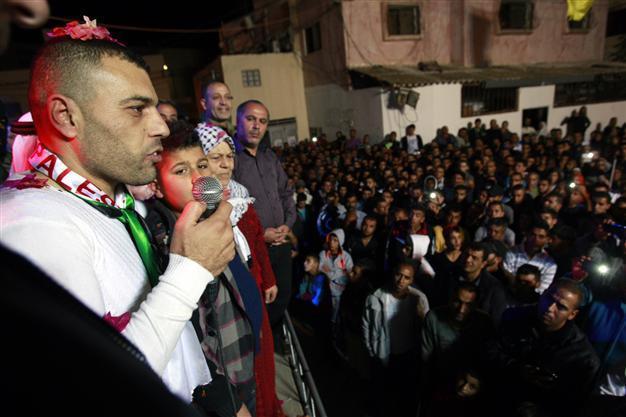Israel tries to ease anger over releases
JERUSALEM

Released Palestinian prisoner Mohammed Sabbagh, left, accompanied by his family members and relatives, speaks to the crowd at his home in the West Bank refugee camp of Jenin after his release, Wednesday, Oct. 30, 2013. AP Photo
Israel announced Oct. 30 new construction in east Jerusalem, an area the Palestinians demand for their future state, just hours after it freed a group of Palestinian prisoners as part of a deal to set in motion peace talks.
The building is seen as an attempt by Prime Minister Benjamin Netanyahu to make up for the prisoner release, for which he has been sharply criticized at home. The prisoners were jailed for deadly attacks on Israelis. Interior Ministry spokeswoman Lital Apter said that four projects are being promoted, including 1,500 housing units in Ramat Shlomo in east Jerusalem and development of an archaeology and tourism site near Jerusalem’s sensitive Old City.
‘Destructive to peace efforts’The release of 26 Palestinians after midnight Oct. 29 was the second of four prisoner releases meant to restart Israeli-Palestinian talks in an effort to reach a final agreement between the two sides. The sequence of events was almost mirror image of an earlier prisoner release on Aug. 13, when a first tranche of 26 prisoners were freed and Israel announced construction of more than 2,000 new settler homes, most of them in east Jerusalem.
The east Jerusalem construction move angered the Palestinians but it was not immediately clear if it would directly impact the talks, which are taking place behind closed doors and away from the public eye, which both sides had agreed to. Nabil Abu Rdeneh, a spokesman for President Abbas condemned the move, saying that “it is destructive to the peace efforts and will only lead to more tensions.”
The Palestinians had long refused to resume peace negotiations with Israel unless it ends construction in territories that Palestinians seek for their state. Israel refused, insisting that settlements and other core issues, including security, should be resolved through negotiations.
The prisoner release was part of an agreement brokered by U.S. Secretary of State John Kerry, which brought Israel and the Palestinians back to the negotiating table after a five-year hiatus. Earlier this year, Kerry managed to persuade Palestinian President Mahmoud Abbas to drop the settlement issue as a condition for restarting negotiations. In exchange, Israel agreed to the prisoner release. In all, 104 Palestinian convicts are to be released over the coming months.
In the West Bank, thousands of people turned out to welcome home the 21 prisoners at a formal ceremony at Mahmoud Abbas’s presidential compound in Ramallah, cheering and waving flags, many holding cellphones aloft to capture the moment.
Abbas ambitious“There will be no (peace) agreement if so much as one Palestinian prisoner remains behind bars,” Abbas told the excited crowd, referring to the 5,000 or so inmates still being held by Israel. In Gaza, the five detainees were met by hundreds of relatives and well-wishers as they emerged through the Erez crossing and entered the strip, sparking energetic celebrations late into the night.
Danny Danon, a hawkish minister from Netanyahu’s Likud party condemned the release in an interview with Israel Radio. “It is tough to see terrorists celebrate when their place is either under the ground or in jail,” Danon said, adding that the release sends the wrong message to young Palestinians.
